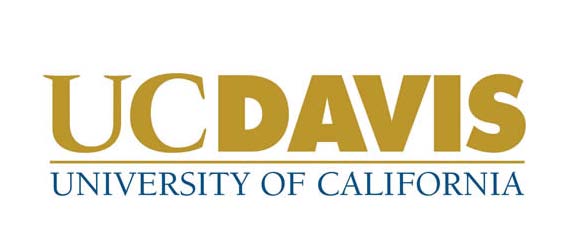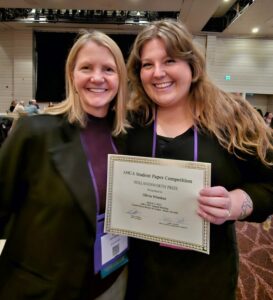
UC Davis postdoctoral scholar and vector-borne disease specialist Olivia Winokur of the Chris Barker lab won the $2600 Hollandsworth Prize for best student research presentation at the American Mosquito Control Association’s annual conference, held recently in Reno.
Winokur delivered her presentation on “Thermal Preferences of Aedes aegypti Mosquitoes.”
Her abstract: “Mosquito-borne pathogen transmission models used to inform control decisions are only applicable if we incorporate the temperatures mosquitoes experience. However, mosquito thermal preferences are not well resolved. We studied Aedes aegypti thermal preferences and found that female Ae. aegypti generally avoided temperatures >30°C on a gradient in the lab, and chose relatively cooler microhabitats in the field as ambient temperature increased. Incorporating these preferences could improve the accuracy of transmission models for Ae. aegypti-borne viruses.”
The Hollandsworth Prize memorializes Gerald Hollandsworth, a past president of the West Central Mosquito and Vector Control Association.
A UC Davis alumna, Winokur received her doctorate in entomology, with a designated emphasis in the biology of vector-borne diseases, in November 2022, studying with Professor Barker of the Department of Pathology, Microbiology and Immunology, School of Veterinary Medicine.
She delivered her exit seminar, as part of the UC Davis Department of Entomology and Nematology weekly seminars, in October on “Temperature Drives Transmission of Mosquito-borne Pathogens: Improving Entomological Estimates for Aedes aegypti-borne Virus Transmission Risk.”
“The mosquito Aedes aegypti is the primary vector of a range of viruses that cause a major burden on human health worldwide, including dengue, Zika, chikungunya, and yellow fever viruses,” Winokur related in her abstract. “As the Zika epidemic emerged in 2016, estimates for Zika risk were based on proxy evidence from closely related dengue virus. To improve risk estimates, we studied how temperature affects Zika virus extrinsic incubation period. We sought to further improve risk estimates by studying thermal preferences of Ae. aegypti mosquitoes in the laboratory and in the field. Current mosquito-borne pathogen risk models primarily use temperatures from weather stations or thermal imagery as a proxy for the temperatures mosquitoes experience, however such approaches do not account for local environments or microclimates available to adult mosquitoes. Taken together, the results of these studies can be used to improve prediction of mosquito-borne pathogen risk and inform mosquito control decisions.”
As a postdoc in the Barker lab, Winokur is working with VectorSurv (https://vectorsurv.org/), and has a fellowship from Pacific Southwest Center of Excellence in Vector-Borne Diseases (https://pacvec.us/), working on “Enriching Practical Learning Resources for Entomological, Medical, and One-Health Curricula.”
Olivia received her bachelor’s degree in May of 2015 from Cornell University where she was an interdisciplinary studies major (environmental effects on human health). She enrolled in the UC Davis graduate program in 2016.
At UC Davis, Winokur served as the 2019-2020 president of the Entomology Graduate Student Association and as a 2020-2022 committee member of the UC Davis Entomology Diversity, Equity, Inclusion, & Belonging. She co-founded the Girls’ Outdoor Adventure in Leadership and Science (GOALS) in 2017 and continues to serve in leadership roles. GOALS is a free two-week summer science program for high school girls and gender expansive youth from backgrounds underrepresented in STEM fields. They learn science, outdoors skills, and leadership hands-on while backpacking in Sequoia National Park.
UC Davis postdoctoral scholar and vector-bone disease specialist Olivia Winokur (right) won the $2600 Hollandsworth Prize for best student research presentation at the American Mosquito Control Association’s annual conference, held recently in Reno. With her is her Cornell undergraduate research advisor Laura Harringon.









